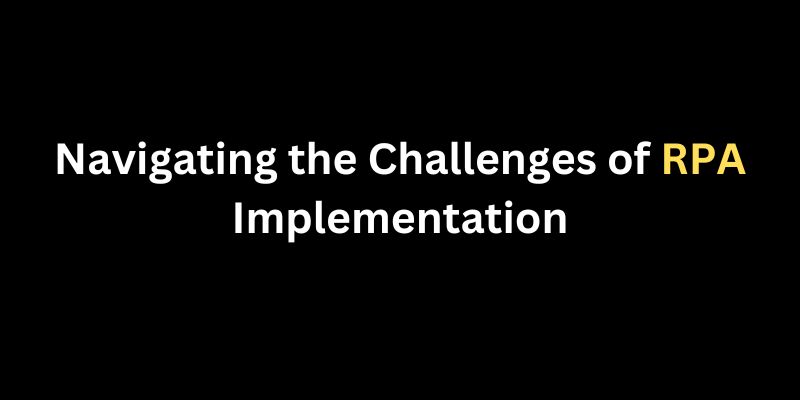
Introduction:
In recent years, Robotic Process Automation (RPA) has emerged as a valuable technology for businesses looking to automate their processes and increase efficiency. However, implementing RPA is not without its challenges.
In this article, we will discuss the challenges of RPA implementation and provide tips on navigating them. The greatest RPA training in Chennai can be found at FITA Academy. With an RPA Course in Chennai, achieve RPA certification. We offer you complete assistance with placement.
Lack of clarity in defining business processes:
Defining business processes is essential to ensure the success of RPA implementation. Without a clear understanding of the business processes, it can be challenging to identify which processes can be automated and which cannot. This lack of clarity can lead to delays in implementation and cause the project to fail.
Resistance to change from employees:
RPA implementation requires changes in the way employees work, which can cause resistance. Employees may feel threatened by the technology and fear that their jobs are at risk.
It is essential to communicate with employees about the benefits of RPA implementation and involve them in the process to mitigate resistance. Join RPA Training Online for hands-on sessions. The best assistance is provided by FITA Institute for learning RPA programming.
Integration with existing systems:
Integrating RPA with existing systems can be challenging, especially if the systems are outdated or do not have open APIs. This can result in delays and increased costs. To overcome this challenge, businesses should conduct a thorough analysis of their existing systems before implementing RPA.
Technical limitations:
RPA is not a one-size-fits-all solution and has its limitations. Some processes may not be suitable for automation, and the technology may not be able to handle complex tasks. It is important to have a clear understanding of the limitations of RPA and identify which processes can be automated and which cannot.
Security concerns:
RPA implementation can create security concerns, particularly if sensitive data is involved. Implementing proper security measures and ensuring that RPA complies with relevant regulations and standards is essential.
Tips for Navigating the Challenges of RPA Implementation:
- Start small and scale gradually
- Involve employees in the process
- Conduct thorough analysis of existing systems
- Work with a trusted RPA vendor
- Invest in proper training and support
Start small and scale gradually:
Starting small and gradually scaling RPA implementation can help businesses identify any issues and ensure that the technology is suitable for their processes. This approach can also help mitigate the risks associated with RPA implementation.
Involve employees in the process:
Involving employees in the RPA implementation process can help mitigate resistance and ensure that the technology is suitable for the business processes. It is essential to communicate the benefits of RPA implementation and provide training and support to employees.
Conduct a thorough analysis of existing systems:
Conducting a thorough analysis of existing systems can help businesses identify potential challenges and ensure that RPA is integrated seamlessly with their systems. This analysis can also help identify which processes can be automated and which cannot.
Work with a trusted RPA vendor:
Working with a trusted RPA vendor can help businesses navigate the challenges of RPA implementation. A reputable vendor can provide guidance and support throughout the implementation process and ensure that the technology is suitable for the business processes.
Invest in proper training and support:
Investing in proper training and support can help ensure that employees understand how to use RPA and can troubleshoot any issues that arise. This investment can also help mitigate resistance to the technology.
Conclusion:
RPA implementation can be a valuable technology for businesses looking to increase efficiency and automate their processes. However, navigating the challenges of RPA implementation requires careful planning and consideration of the potential challenges.
By defining business processes, involving employees, conducting a thorough analysis of existing systems, working with a trusted vendor, and investing in proper training and support, businesses can successfully navigate the challenges of RPA implementation and realize the benefits of this technology.
Interested in learning about robotic process automation? Get hands-on training from professionals by enrolling in RPA training in Coimbatore. The RPA training in Coimbatore will provide thorough insights into fundamental and advanced principles.
Read more: RPA Developer Salary For Freshers.
